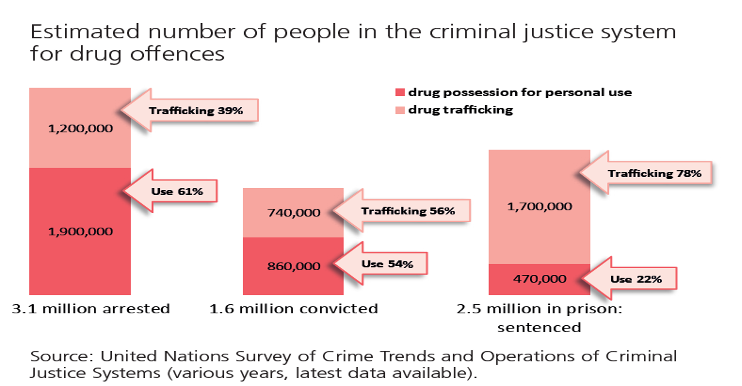
According to the newly released World Drug Report 2021, about 257 million people, aged between 15-64 worldwide used drugs at least once in the previous year. While 36.3 million people who use drugs suffer from drug use disorders, access to treatment of drug use disorders remains limited. Only one in eight people in need has access to treatment.
In line with the “International Standards for the Treatment of Drug Use Disorders” (UNODC/WHO, 2020) and high-level policy documents such as the outcome document of the 2016 United Nations General Assembly Special Session on the World Drug Problem “Our joint commitment to effectively addressing and countering the world drug problem”1, drug use disorders are complex multifactorial health disorders that are best treated through a health response and in the health system. Parties to the International Drug Control Conventions2 have made a commitment to provide measures such as prevention of drug use, early identification, treatment, education, after-care, rehabilitation, and social reintegration. Such measures can be provided as an alternative to conviction or punishment in cases of drug-related offences related to personal consumption and other cases of a minor nature.
Many people with drug use disorders are in contact with the criminal justice system at some point in their lives, and many people in the criminal justice system have a history of drug use. UNODC PTRS supports Member States in their efforts to provide effective treatment and care for people with drug use disorders, including for those in contact with the criminal justice system as an alternative to conviction or punishment or in prison settings.
In response to the Commission on Narcotic Drugs (CND) resolution 58/5 “Supporting the collaboration of public health and justice authorities in pursuing alternative measures to conviction and punishment for appropriate drug related offences of a minor nature”, UNODC and WHO launched the initiative on Treatment and care for People with Drug use Disorders in Contact with the Criminal Justice System and published the handbook “Treatment and Care for People with Drug Use Disorders in Contact with the Criminal Justice System: Alternatives to Conviction or Punishment”, which provides rationales, principles and existing interventions to offer alternatives to conviction or punishment for people with drug use disorders in contact with the criminal justice system – all along the criminal justice continuum from pre-arrest to post-sentencing.

As a follow-up, in 2021, UNODC PTRS reached out to UN Member States and civil society and initiated a series of informal consultations leading up to a technical expert meeting in 2022. These consultations will guide the development of principles for treatment as an alternative to conviction or punishment at different stages of the criminal justice continuum, from pre-arrest, pre-trial, trial stage and post-sentencing stage, with a view to the role of certain professional groups. In addition, UNODC/PTRS together with UNODC field offices continues to support Member States at country-level in their efforts to enhance the implementation of treatment as an alternative in adequate cases of a minor nature.

The estimated number of people in prison is 11 million globally (World Prison Population List, 12th Edition). 3,23 million are in contact with the criminal justice system for drug possession for personal use, and 470,000 people are estimated to be in prisons for drug possession for personal use3.
Prison overcrowding increases health risks associated with imprisonment. Even though people with severe mental health disorders shall not be detained in prison, in line with the United Nations Standards Minimum Rules for the Treatment of Prisoners (the Mandela Rules), higher rates of mental health disorders including drug use disorders have been identified in prevalence studies repeatedly . And rates of problematic drug and alcohol use is often higher among female inmates than male inmates. (Treatment Toolkit for Women, UNODC, 2004).

Evidence-based treatment of drug use disorders not only improves health outcomes but also reduces involvement in criminal behaviour and benefits the community (NTIES, 1997). People with mental health disorders in contact with the criminal justice system shall not be detained in prison, as promoted in the Mandela Rules. In prisons, following the principle of equity, the same standards of health care that are available in the community and access to the necessary health-care services to prisoners free of charge and without discrimination, needs to be ensured.
In 2021, UNODC/PTRS conducted a systematic literature review with the intent to identify effective interventions for mental health including substance/drug use disorders (S/DUDs) in prison settings, considering both health-related and crime-related outcomes. A technical consultation on the topic is planned to be conducted before the end of 2021.

Much more needs to be done to ensure affordable access to effective evidence-based prevention, treatment and care for the people who desperately need them, including those in prison settings. One way to start is through multi-sectorial collaboration, especially between health and justice actors.
Therefore, in the month of Nelson Mandela Day, UNODC PTRS is joining the virtual awareness-raising campaign #Act4MandelaRules and promotes evidence-based treatment for people with drug use disorders in contact with the criminal justice system, as an alternative to conviction or punishment and for those in prison settings.
1 https://www.unodc.org/documents/postungass2016/outcome/V1603301-E.pdf
2 The international drug control conventions are the 1961 Single Convention on Narcotic Drugs as amended by its 1972 Protocol (1961 Convention); the 1971 Convention on Psychotropic Substances (1971 Convention); and the 1988 United Nations Convention Against the Illicit Traffic in Narcotic Drugs and Psychotropic Substances (1988 Convention)
3 https://wdr.unodc.org/wdr2020/field/WDR20_BOOKLET_6.pdf
https://www.unodc.org/unodc/frontpage/2021/March/unodc-building-networks-behind-prison-walls-webinar-series-continues-with-special-focus-on-mental-health-in-prisons.html